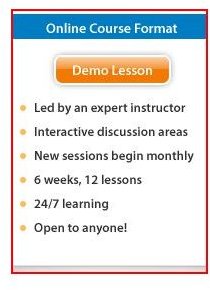Prep Courses to Help You Prepare for an Online Education
Skills You Will Need
Online courses require a lot of reading and writing. If you are not confident in reading and writing, strengthening those skills before you start a real online course will help you.
Also, people have different learning styles. For example, there may be visual aids (diagrams, animations photos, or videos) for a visual learner or there may not be. This does not mean that if you learn best with visual aids that you cannot succeed, you can, but it may take more work to understand the material without them. Ask about this before signing up for a course. In the list of practice courses below, some have visual enhancement, and some do not.
Getting the Most out of a Prep Course
To understand the discipline and commitment you will need to take the actual course, use these tips to get the most practice.
- Choose a course that you want to learn more about to get the most genuine experience.
- Follow the course syllabus, schedule and due dates as if you were taking the real course.
- Get a planner to schedule when you will study and practice around other daily activities.
- Do the required readings and the assignments.
- Do a timed reading/lesson to see how long it takes to finish the lesson.
- Take notes as if it were a college course and you were following the requirements.
- Answer the questions and take the quizzes.
- Use the forum to ask questions if it is available.
Now let’s consider the courses. Together they will give you an idea of how online learning works. All of them are good.
Education to Go
ed2go - Four sample courses to try, Introduction to Microsoft Access 2003, Creating a Successful Business Plan, Get Assertive!, and Solving Classroom Discipline Problems are available. Although they are continuing education courses for an adult learner, the demo,
which is free to try, is similar to what a real college course would be like. Start by selecting one of the courses from the interface and then navigate to the welcome note from the instructor, tabs for resources, lessons and chapters to read, quizzes (which are graded when they are completed), assignments, and even a discussion board.
.
Vision Learning
Visionlearning - Another good course to get your feet wet is Visionlearning. These are science learning modules with a lesson to read, a question or quiz, and extra reading resources and links. Choose a science module from the Library on the right hand side of the Visionlearning page to try it. In addition, they have support for the visual learner, because they also provide you with interactive animations.
John Hopkins
John Hopkins Bloomberg School of Public Health (JHSPH) - John Hopkins University offers Opencourseware in suit with other universities such as MIT, Harvard, and Yale. To take their course, choose a topic of interest on the left hand side of the JHSPH page. A list of courses to choose from follows on the next page. Click on a course to get the course description. On the left hand side of the page is the course syllabus, schedule of lectures and readings, lecture materials to read, and the required textbook. These courses are similar to what an online course would be like.
Open University
Open University (OU) - Open University has a wealth of courses for practice, so browse the whole website. The selected course, Reading and Note Taking- Preparation for Study, is good for a potential student to take to learn how to read and take notes in a college course. This course serves a dual purpose; it is great for practice and will prepare you for the reading and writing requirements in college. Navigation is easy; just use the arrow to advance to the next page.
University of California
UC College Prep Open Access - Given by the University of California, UC-Prep Courses are designed to help K-12 students prepare for college and are similar to what an online learning environment is like. Specifically, An Introduction to an Online Course is useful. Also, follow through to the Calaxy website on the UC College Prep homepage for multimedia presentations and interactive activities that enhance the learning experience.
Slow and Steady Wins the Race
Taking the courses a few times will help you prepare for an online education. If you have decided that they were helpful, and are ready to explore the online learning venture, it is a good idea to start slow. Begin with a course or two until you get used to how it works, the time commitment, the support system and if it suits you before investing money into the degree.
References
- Screenshot, Laurie Patsalides: Courtesy of ed2go.
- Source: Laurie Patsalides researched and shared these courses to help future students on their journey.
This post is part of the series: Ready, Set, Learn
Don’t be left in the dark before starting your online courses. Get some help with the things you will need to prepare with this great series.
